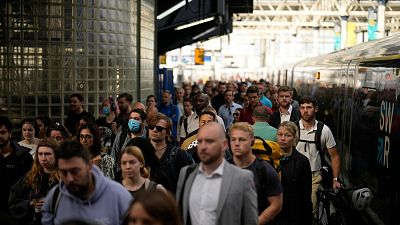Thousands of trains cancelled as UK’s biggest staff walkout in 30 years begins

Train passengers in the UK face widespread cancellations and disruptions as a nationwide rail strike begins on Tuesday.
More than 40,000 staff have walked out over pay, future job losses and working conditions. Members of the Rail, Maritime and Transport union (RMT) at Network Rail and 13 train operators are striking on 21, 23 and 25 June.
Half of Britain’s rail lines will be closed on Tuesday, Thursday and Saturday. Only around 4,500 of the regular 20,000 daily rail services in the UK are expected to run during the strike. Those that do run will mostly be on main lines but will be open between 7:30 am and 6:30 pm.
It has left much of Britain, including Scotland, Wales and the whole of Cornwall and Dorset, with few passenger trains during the day.
London Underground workers are also staging a 24 hour walk-out on Tuesday with nearly the entire network grinding to a halt. All tube lines are currently fully or partially suspended with buses, the DLR and tram services the only public transport currently unaffected.
Transport for London has advised passengers to avoid travelling and to complete their journey before 6 pm if they must make a trip.
Disruption is expected to continue throughout the week – even on non-strike days. Even train companies whose employees are not taking part in the action are anticipating delays as signal workers from Network Rail, the company that maintains the system, are taking part.
A severely reduced timetable has already been published showing the reduced service and passengers have been urged not to travel by rail this week.
Motorists are also being warned to expect a surge in traffic as large parts of the rail network are brought to a halt and commuters find other ways to travel. British motoring association, the AA, says the worst affected roads will be main motorways as well as rural and suburban areas.
It comes as thousands of people are due to travel to Glastonbury Festival in Somerset, England, which starts on Wednesday.
Are trains to Glastonbury Festival cancelled?
After being forced to cancel twice due to the COVID-19 pandemic, Glastonbury is celebrating its 50th year this week. It is the UK’s biggest and most famous music festival with a crowd the size of a town descending on Pilton in the south west of England for the five day event.
More than 200,000 people are expected to travel to the Somerset site which opens on Wednesday.
Over half the trains from London to Glastonbury Festival have already been cancelled. Before the industrial action was announced, 51 specially scheduled trains were expected to run over the three-day period.
But now, just five services from London Paddington to Castle Cary – the closest station to the festival – are operating on Thursday. A total of 24 trains will run between Wednesday and Friday.
UK train operator GWR has said that it plans to “maintain timetabled trains” throughout the week. Some times may be altered but it says it will be in contact with customers who have booked seats on these services.
Around 58 services will still travel from London and other UK locations to Castle Cary, carrying a total of 8,000 people.
But other routes that festival goers may use to reach a connecting station could still be impacted.
“Other parts of the GWR network are likely to be more affected by the strike action and customers may need to consider alternative ways to travel to a station serving Castle Cary,” GWR told passengers.
Glastonbury is regarded as one of the greenest festivals in the UK but now drivers are being warned to avoid the area as cars and coaches making up for the reduced rail services could create major traffic jams.
Why are UK railway workers striking?
RMT union bosses say that workers are facing “an aggressive agenda of cuts to jobs, conditions, pay and pensions”.
Last-minute talks between railway bosses and union leaders on Monday failed to prevent the strike. RMT general secretary Mick Lynch said the dispute could not come to an end without the government “removing the shackles” on train companies.
He warned travellers that industrial action could continue for months.
“RMT has no choice but to defend our members industrially to stop this race to the bottom,” he said.
Lynch added that strikes on Network Rail, train operators and the London Underground will go ahead this week.
“It is clear that the Tory Government after slashing £4bn (€4.7bn) of funding from National Rail and Transport for London, has now actively prevented a settlement to this dispute.
“The rail companies have now proposed pay rates that are massively under the relevant rates of inflation, coming on top of the pay freezes of the past few years,” he explained.
The Department of Transport has disputed RMT’s claims. It added that keeping the railways running during the pandemic cost UK taxpayers around £600 (€698) per household.
Transport Secretary Grant Shapps said that the strikes were “orchestrated by some of the best-paid union barons, representing some of the better-paid workers in this country, which will cause misery and chaos to millions of commuters.”
